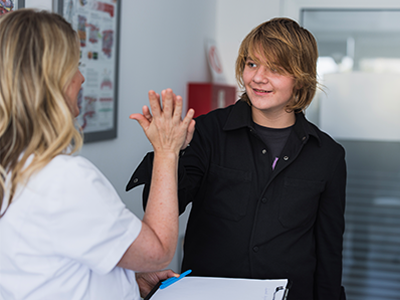There are many joyous moments we get to share with patients and families in pediatric practice – from a first visit with a newborn to first steps and first words. For me, one of the happiest visits with patients is when they share their college acceptance letters. The years of hard work, parental investment and medical care all contribute to a teen receiving their college acceptance letters. To see them on the verge of young adulthood, ready to live more independently and experience college, is always a big developmental milestone that students, parents and pediatricians can celebrate. As you spend the next few months helping your child prepare for the transition to college, it’s important to keep the following in mind:
- Make an appointment for a checkup with your pediatrician. Be sure you bring the health forms required by the college and note the deadlines for submission.
- Make a transition plan for any chronic, ongoing medical issues your teen has. This might involve calling the student health center on campus ahead of time and sending records to one of the doctors there. Be sure you understand the mental health resources on campus – if your teen currently receives regular therapy or psychiatric treatment, how will that be continued in college? Will they continue treatment with their current doctor or therapist via Skype, or will your teen transition to an on-campus provider? If your teen takes daily medication, how will that be refilled at college?
- Encourage your teen to think about their community of support at college. Help them explore the on-campus resources available to assist students, such as student health, academic assistance, counseling services and others.
- Emphasize the basics – sleeping, eating and exercise. College is a fast-paced, technology driven experience for many students today. The basics matter. A routine for eating regularly, getting sufficient sleep and exercising is critical to prevent burnout and mental health issues.
Most importantly, do all of this with your college-bound teen. Empower them to take charge of their health care so that they can grow as confident young adults and begin to manage their medical needs.
 https://riseandshine.childrensnational.org/wp-content/uploads/2025/12/Mom-nursing-feature.jpg
300
400
Rise and Shine
https://riseandshine.childrensnational.org/wp-content/uploads/2017/11/childrens_riseandshine_logo.jpg
Rise and Shine2025-12-04 11:29:032025-12-04 11:29:03Tips for surviving your first month of breastfeeding
https://riseandshine.childrensnational.org/wp-content/uploads/2025/12/Mom-nursing-feature.jpg
300
400
Rise and Shine
https://riseandshine.childrensnational.org/wp-content/uploads/2017/11/childrens_riseandshine_logo.jpg
Rise and Shine2025-12-04 11:29:032025-12-04 11:29:03Tips for surviving your first month of breastfeeding





















Leave a Comment
Want to join the discussion?Feel free to contribute!